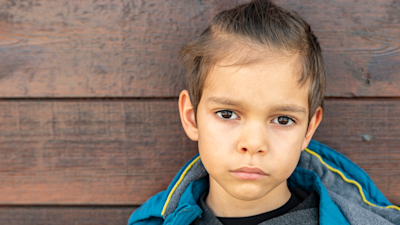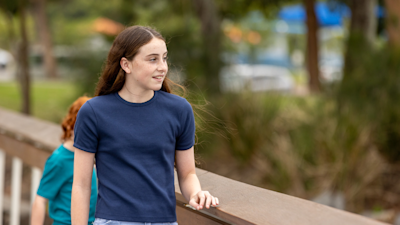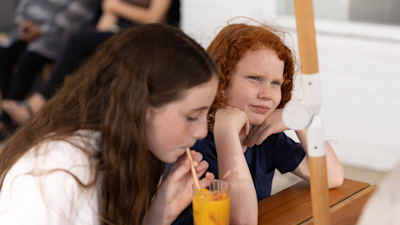Hear how parents’ lived experiences, tenacity and teamwork have produced green shoots of inclusion within the child protection system.

Image: Parent and family leaders and advocates at the “Green shoots” forum. Left to right: Leanne Coulson – CEO, Parents on a Mission, Maddie – Parent Inclusion Network, South East QLD, Felicity Kime, CEO FISH Jo Mason – Host. Micah Project, Member
Jessica Cocks, Life Without Barriers' Practice Lead for Children, Families and Young People joined families, advocacy groups and related agencies at a forum centred on family inclusion in the child protection system. Her presentation on parent peer advocacy inclusion was so powerful it caught the attention of the Queensland government.
Hosted by the Family Inclusion Network, the forum topic ‘Green shoots – how parents lived experiences, tenacity and teamwork have produced green shoots of inclusion in the child protection system' inspired a focused discussion on the importance of family inclusion in what can be a complex and traumatic system for families to navigate.
Jessica's opening call to action encouraged 'better and stronger pathways' for parent peer and family support advocates in the system because 'the vast majority of Australian parents don't get the opportunity to readily connect with people who know what it's like and who have been through it’. Peer parent and family advocates are parents and family members with lived experience of child protection intervention. They support and advocate for parents and family who are currently experiencing that intervention.
Jessica was accompanied and supported by members of Family Inclusion Strategies in the Hunter (FISH). Felicity Kime is the president of FISH and described how 'alone' parents could feel trying to understand child protection processes, explaining the FISH parent peer program is a breakthrough for those parents.
"If we help the parent, we help the children – these children will be so happy."
Increasingly, the research from around the world provides a compelling story about why that's the case.
Across Australia 46,000 children remain in out-of-home and that number continues to grow.
So, why is that? Jessica Cocks says the critical change over that time has been integrating parent peer and family advocacy in policy work, in individual casework, and essentially across the whole child protection system, citing increased family reunification as a key outcome.
The recipient of a Churchill Fellowship – an internationally recognised award where successful applicants gain expertise from around the world on a key area of passion – Jessica Cocks has also seen the evidence up close.
During her research trip to New York City and Norway, she observed that parent and family advocacy programs that were making a difference to children included increasing reunification and supporting parents with children in care to form stronger relationships with their kids.
These successful outcomes remain a driving force behind Jessica’s championing of parent peer advocacy. Above all, she says peer parent and family advocacy aims to increase the participation of parents and family at all levels of the child protection system.
"I have worked in child protection and out-of-home care most of my career, and it just became increasingly obvious to me that most of the children I worked with wanted to be with their families. Their sense of belonging and who they were was so deeply affected - in no way are we able to replace family," Jessica said.
"It's all about kids and children's rights – it's not about feeling sorry for families."
All Australian state governments agree that family reunification rates in Australia remain too low at around 20%. For new-borns, this may be as low as 7%. The research shows if family reunification is increased, it will and can drive down the high numbers of kids in care. Parent and family peer advocacy and support is recognised as a critical element of how that is achieved.
The goal for Jessica Cocks is to see peer parent and family advocacy become a reality in Australia. She says if that's the case, it will be ‘absolutely life-changing.
Children who have strong family relationships do better across all domains, they do better at school, they do better in the labour market, they're less likely to get pregnant; they're less likely to go to jail; all of those things are improved if children's family relationships are strong and of high quality.
"It's a game-changer for kids if we can make it happen."


